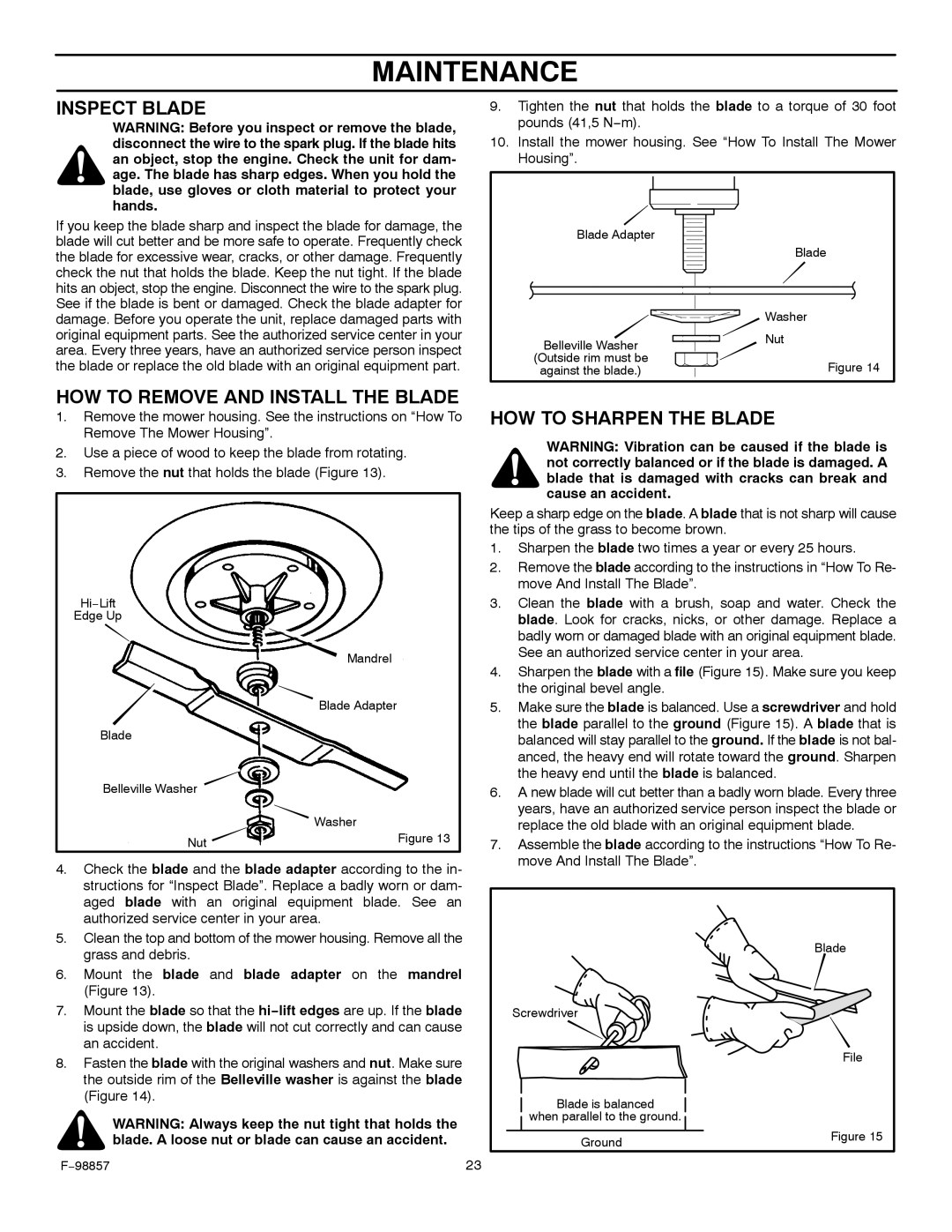
MAINTENANCE
INSPECT BLADE
WARNING: Before you inspect or remove the blade, disconnect the wire to the spark plug. If the blade hits an object, stop the engine. Check the unit for dam- age. The blade has sharp edges. When you hold the blade, use gloves or cloth material to protect your hands.
If you keep the blade sharp and inspect the blade for damage, the blade will cut better and be more safe to operate. Frequently check the blade for excessive wear, cracks, or other damage. Frequently check the nut that holds the blade. Keep the nut tight. If the blade hits an object, stop the engine. Disconnect the wire to the spark plug. See if the blade is bent or damaged. Check the blade adapter for damage. Before you operate the unit, replace damaged parts with original equipment parts. See the authorized service center in your area. Every three years, have an authorized service person inspect the blade or replace the old blade with an original equipment part.
HOW TO REMOVE AND INSTALL THE BLADE
1.Remove the mower housing. See the instructions on “How To Remove The Mower Housing”.
2.Use a piece of wood to keep the blade from rotating.
3.Remove the nut that holds the blade (Figure 13).
Hi−Lift
Edge Up
Mandrel
Blade Adapter
Blade
Belleville Washer
| Washer |
Nut | Figure 13 |
|
4. | Check the blade and the blade adapter according to the in- |
| structions for “Inspect Blade”. Replace a badly worn or dam- |
| aged blade with an original equipment blade. See an |
| authorized service center in your area. |
5. | Clean the top and bottom of the mower housing. Remove all the |
9.Tighten the nut that holds the blade to a torque of 30 foot pounds (41,5 N−m).
10.Install the mower housing. See “How To Install The Mower Housing”.
Blade Adapter |
|
| Blade |
| Washer |
Belleville Washer | Nut |
| |
(Outside rim must be | Figure 14 |
against the blade.) |
HOW TO SHARPEN THE BLADE
WARNING: Vibration can be caused if the blade is not correctly balanced or if the blade is damaged. A blade that is damaged with cracks can break and cause an accident.
Keep a sharp edge on the blade. A blade that is not sharp will cause the tips of the grass to become brown.
1.Sharpen the blade two times a year or every 25 hours.
2.Remove the blade according to the instructions in “How To Re- move And Install The Blade”.
3.Clean the blade with a brush, soap and water. Check the blade. Look for cracks, nicks, or other damage. Replace a badly worn or damaged blade with an original equipment blade. See an authorized service center in your area.
4.Sharpen the blade with a file (Figure 15). Make sure you keep the original bevel angle.
5.Make sure the blade is balanced. Use a screwdriver and hold the blade parallel to the ground (Figure 15). A blade that is balanced will stay parallel to the ground. If the blade is not bal- anced, the heavy end will rotate toward the ground. Sharpen the heavy end until the blade is balanced.
6.A new blade will cut better than a badly worn blade. Every three years, have an authorized service person inspect the blade or replace the old blade with an original equipment blade.
7.Assemble the blade according to the instructions “How To Re- move And Install The Blade”.
| grass and debris. |
6. | Mount the blade and blade adapter on the mandrel |
| (Figure 13). |
7. | Mount the blade so that the hi−lift edges are up. If the blade |
| is upside down, the blade will not cut correctly and can cause |
| an accident. |
8. | Fasten the blade with the original washers and nut. Make sure |
| the outside rim of the Belleville washer is against the blade |
| (Figure 14). |
WARNING: Always keep the nut tight that holds the blade. A loose nut or blade can cause an accident.
F−98857 | 23 |
Screwdriver
Blade is balanced
when parallel to the ground.
Ground
Blade
File
Figure 15
